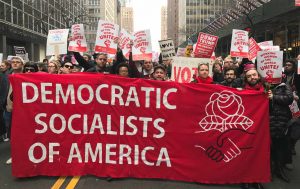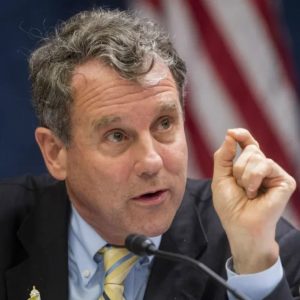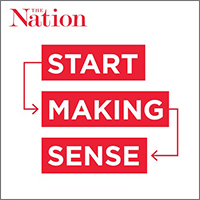 Listen HERE
Listen HERE
It’s been ten years since Haiti was devastated by the earthquake that killed more than a hundred thousand people. Amy Wilentz, who has been reporting on Haiti for three decades, returned to the island and found the country oddly calm, despite deepening poverty, violence, and corruption. She also found “little sprouts of possibility everywhere.”
Also: We have a lot of experts on what to do about poverty — academics and policy makers. Mia Birdsong has been working with a different sent of experts: poor people themselves. She’s a Senior Fellow of the Economic Security Project, and her TED talk “The Story We Tell About Poverty Isn’t True” has been viewed almost two million times. Now she has a new 4-part podcast at The Nation – it’s called “More Than Enough.”
Plus: Democratic socialism, American style: Kate Aronoff and Michael Kazin talk about socialism in America today—they are co-editors with Peter Dreier of “We Own the Future,” which includes chapters on sports, banks, work, health care, campaign finance, immigration, and families. 1/16/19
Start Making Sense
The Failure of Trump’s Iran Strike: Andrew Bacevich, plus Henry Louis Gates on American Slavery and Jelani Cobb on Joe McCarthy
 Listen HERE
Listen HERE
Trump’s Iran strike continues a long, failed history of American actions based on the idea that the U.S. military can shape the mideast in accord with our wishes. That’s what Andrew Bacevich argues—his new book is The Age of Illusions: How America Squandered its Cold War Victory.
Plus: Henry Louis Gates discovers slave-owners – and also slaves—in the family histories of some surprising people–on the PBS series “Finding Your Roots.” On this season’s premiere, Anjelica Houston learned that one of her ancestors, who died in Maryland in 1811, was a slaveowner, and that in his will he acknowledged fathering four slave children. Gates, the Alphonse Fletcher University Professor at Harvard University, also talks about his collaboration with historian Eric Foner on the award-winning PBS documentary on Reconstruction.
Also: Joe McCarthy as a predecessor of Donald Trump: the connections and similarities (“McCarthy was willing to assert things that he knew weren’t true, and did it with aplomb”) are traced by Jelani Cobb of The New Yorker and the Columbia University faculty. He’s a contributor to the new McCarthy episode of the PBS series “American Experience.” 1/9/20
Trump Will Lose in 2020: Stan Greenberg, plus Naomi Klein on the Green New Deal and J. Hoberman on Reagan and the Movies
 Listen HERE
Listen HERE
The 2020 election will liberate us from Donald Trump and Republican hegemony. A sweeping Democratic victory will make it possible at last for us to address our most serious problems — because 2020 will bring the death of the Republican party as we’ve known it. That’s what Stan Greenberg says – he’s a longtime pollster and adviser to presidents from Clinton to Obama. He’s also a bestselling author, with a new book out – it has the wonderful title R.I.P. G.O.P.: how the New America is Dooming the Republicans.
Plus: Naomi Klein on the Green New Deal— she says we need to follow the example of the New Deal era of the 1930s, when nothing would have happened without “massive pressure from social movements” that “changed the calculus of what was possible.” Naomi is the author of several number one bestsellers, including “This Changes Everything.”
Also: movies and politics. No political figure has blurred the line between them more than Ronald Reagan – and no president understood the power of collective fantasy better than Reagan did. That’s what the great movie critic J. Hoberman says – his new book about movie culture in the Age of Reagan is called “Make My Day.” 12/31/19
Socialism is On the Agenda for 2020: Katrina vanden Heuvel; plus Kathleen Belew on White Nationalism & Rick Perlstein on Impeachment
 Listen HERE
Listen HERE
Capitalism is broken – that’s why socialism is on the agenda for 2020. Katrina vanden Heuvel explains – she’s publisher and editorial director of The Nation.
We also look back at some of the big events of 2019, and some of our favorite interviews, starting with the terrorist attacks by white nationalists, in El Paso and elsewhere. Historian Kathleen Belew says they are NOT isolated events carried out by loners; in fact they are connected, the work of a movement, with tens of thousands of active members.
Also 2019 of course has been the year of impeachment — historian Rick Perlstein has comment and analysis. 12/24/19
Does Boris Johnson’s victory in the UK mean Trump will win in the US?
D.D. Guttenplan, plus John Nichols with the Progressive Honor Roll
and Arundati Roy on India
 Listen HERE
Listen HERE
The British Labour Party suffered a historic defeat last week—working class people who voted Labour their entire lives have now switched sides. Centrists in the Democratic Party say this means that the socialist program doesn’t work as an alternative to racism and xenophobia–in other words, it’s bad news for Bernie. And for us at The Nation. They say Boris Johnson is a lot like Donald Trump, and that Boris’s victory suggests Trump will win in 2020—the way Brexit foretold the 2016 vote in the US. D.D. Guttenplan disagrees, and explains why.
Plus: the end of the year brings The Nation’s progressive honor roll for 2019 – honoring those who’ve done the steady work of advancing economic, social and racial justice. John Nichols names the elected officials and also activists, organizations, and ideas that are shaping our future.
Also: this week India is on fire–with massive protests, and massive repression, of Muslim students saying “no” to the government’s move toward making India a Hindu nation – the great Indian novelist and activist Arundhati Roy explains. 12/19/19
Progressives and White Working-Class Voters: Joshua Holland, plus Katha Pollitt on Fetal Personhood and Ruth Marcus on Brett Kavanaugh
 Listen HERE
Listen HERE
Some analysts criticize progressives who urge Democrats to focus on turning out their core base—people of color, unmarried women, and younger voters—they say it’s a big mistake to give up on working class whites. And many progressives reply that it would be a disaster for the Democrats to try to “win back” working class white Trump voters by not talking about discriminatory policing, reproductive health care, and LGBTQ rights. Joshua Holland examines the actual evidence—and concludes that Democrats have already won back enough white working-class voters to defeat Trump in 2020.
Also: What happens to pregnant women when anti-abortion state legislatures grant legal personhood to fertilized eggs, embryos, and fetuses? What happens when pregnant women’s behavior is criminalized? Katha Pollitt reports.
Also: Brett Kavanaugh was not on the list of candidates for the Supreme Court that Trump released during the campaign—how did Kavanaugh end up ahead of everybody else? Ruth Marcus of the Washington Post has that story—her new book is Supreme Ambition: Brett Kavanaugh and the Conservative Takeover. 12/11/19
How the Dems Can Win in 2020: Lessons of the Virginia Victories–Joan Walsh, plus Jeet Heer on Trump and War Crimes and Bryce Covert on Strikes
 Listen HERE
Listen HERE
Democrats need to learn the lessons of their historic victory last month, when Virginia became the first Southern state in the post–civil-rights-movement era to entirely flip back to Democratic control. Virgina Democrats now hold the governorship AND both houses of the state legislature. How did they do it? Joan Walsh says one key was that Republican attacks on abortion didn’t send Democrats running scared.
Also: Trump’s pardons for war criminals: Jeet Heer says the military is right to stand up for the laws of war, but the basic issue is a political one, and the military can’t make this a political fight. But the voters can.
And Bryce Covert has been examining strikes in America over the last couple of years. More workers went on strike last year than at any time since 1986 – more than 20 years ago. They include public sector workers, like teachers and nurses, and corporate employees, like auto and hotel workers – and even low-paid, part-time and temporary people who don’t have unions—like fast food workers and Uber drivers. 12-4-19
‘It Can’t All Be Bernie’: The Candidate with John Nichols, plus Adam Hochschild on deportation and John Powers on “The Irishman”
 Listen HERE
Listen HERE
Bernie Sanders says it will take a movement to change America: “It can’t all be Bernie.” John Nichols comments on his interview with the candidate, who is now back in second place in the polls. And we play clips from the interview, originally broadcast on the Next Left podcast.
Also: deporting the immigrants called “undesirable”–now, under Trump, and a hundred years ago. Historian Adam Hochschild notes that it’s the 100th anniversary of the Palmer Raids, where J Edgar Hoover got his start rounding up and trying to deport immigrant radicals—and when one heroic Labor Department official blocked thousands of deportations.
Plus: Martin Scorcese’s new film “The Irishman” opens on Netflix this week; it claims to tell the true story of the murder of Jimmy Hoffa, the head of the Teamsters Union, who disappeared in 1974. But nobody who’s studied that history thinks the movie is right about what happened to Hoffa. Does that fact change our judgement about the film? John Powers comments; he’s critic at large for Fresh Air with Terry Gross. 11-27-19
Gail Collins: Ruth Bader Ginsberg and Older Women; plus Rick Perlstein on Impeachment and Eric Foner on The 1619 Project
 Listen HERE
Listen HERE
The adventures of older women in America: Ruth Bader Ginsburg for example is 86,and Nancy Pelosi just turned 80. But where are the prominent Republican women in politics today who are older? Gail Collins has been thinking about that; of course she’s the New York Times op-ed columnist. Her new book is No Stopping Us Now.
Also: Rick Perlstein says the Nixon impeachment limited the charges against the president in order to win a Republican majority in the Senate; since that’s not going to happen with Trump, the Democrats might as well include all his high crimes in their articles of impeachment.
And historian Eric Foner talks about the New York Times’s “1619 Project,” which argues that the legacy of slavery is central to all of the American past and present. 11/21/19
Sherrod Brown: How to Beat Trump; plus D.D. Guttenplan on Joe Biden and Thom Hartmann on the Supreme Court
![]()
 Listen HERE
Listen HERE
Sherrod Brown, the senior senator from Ohio, was re-elected in 2018. He won by 7 points—in a state Hillary Clinton had lost—by 8 points—just 2 years earlier. What are the lessons for 2020? “You need to talk to workers,” he says, “and you need to fight for workers—all workers.” Now he has a new book out: Desk 88 – Eight progressive senators who changed America.
Also: why Joe Biden is the wrong candidate to take on Donald Trump: D.D. Guttenplan, The Nation’s editor, explains why the magazine has published an “anti-endorsement.”
Plus: this week the Supreme Court heard arguments about the fate of DACA residents—whether those young people brought here as small children should be deported. But why should that be decided by the nine justices on the Supreme Court? In a democracy, shouldn’t that be decided democratically? That’s Thom Hartmann’s argument—not just about DACA, but about all of judicial review. His new book is The Hidden History of the Supreme Court. 11-17-19
